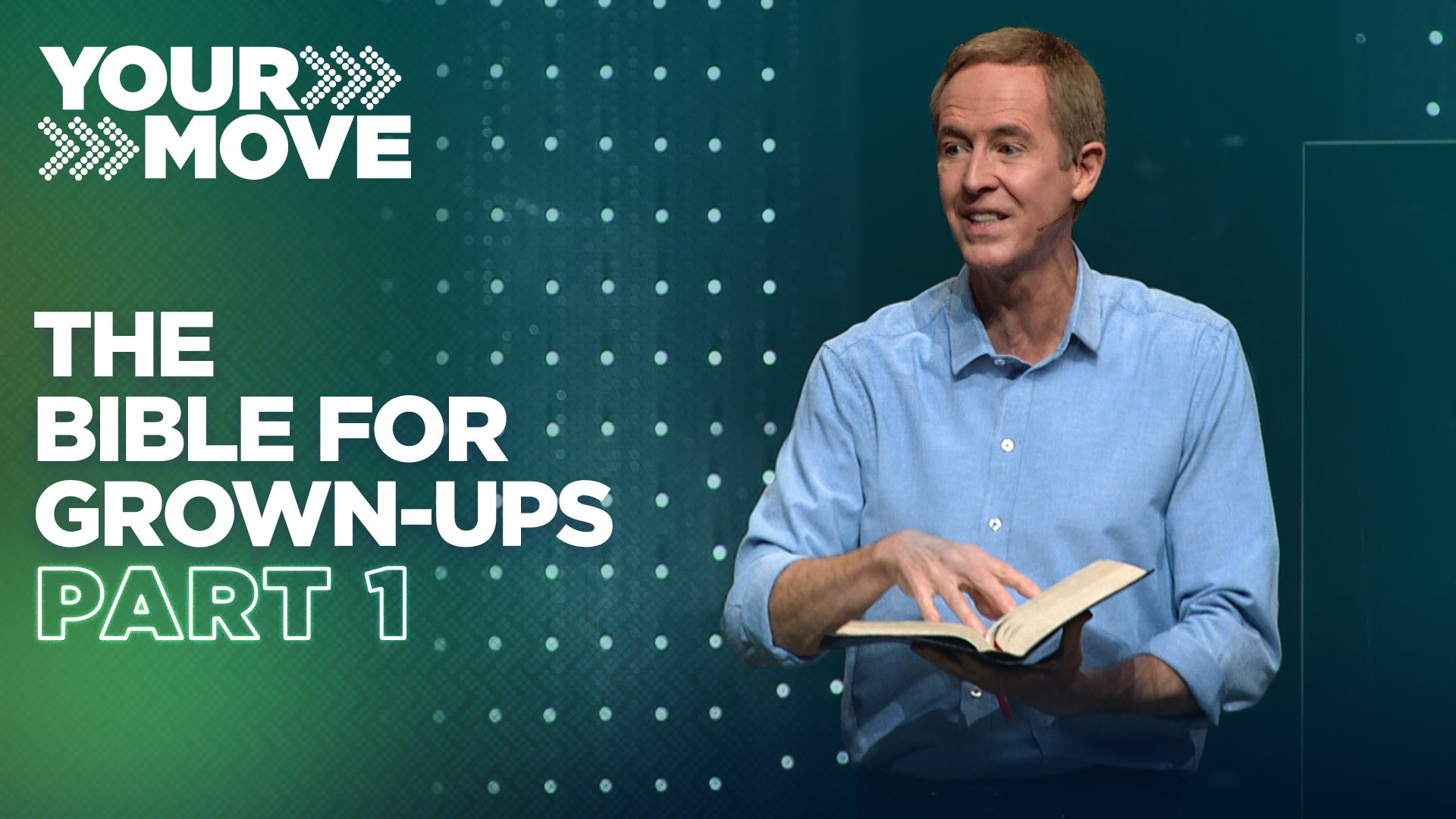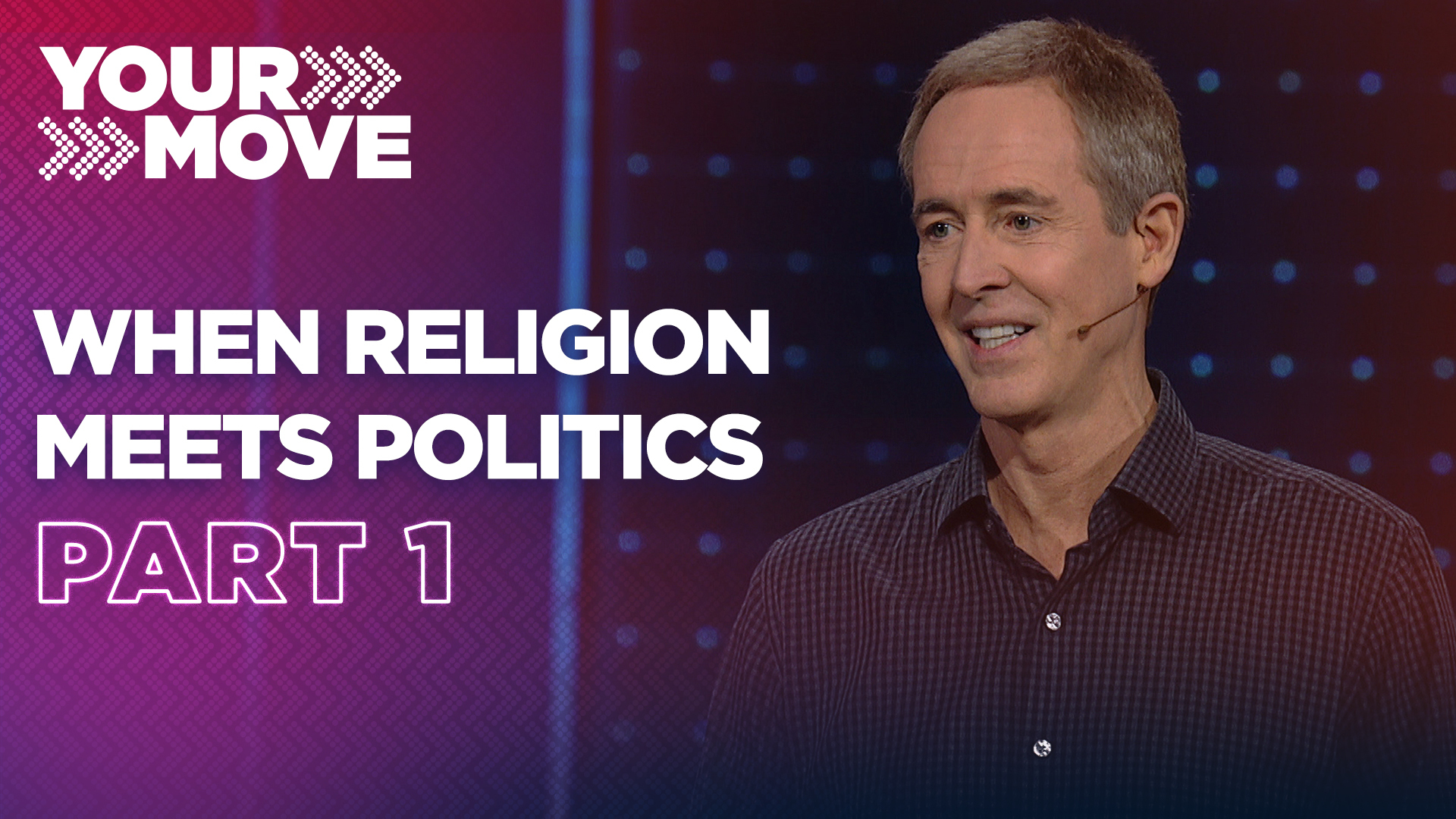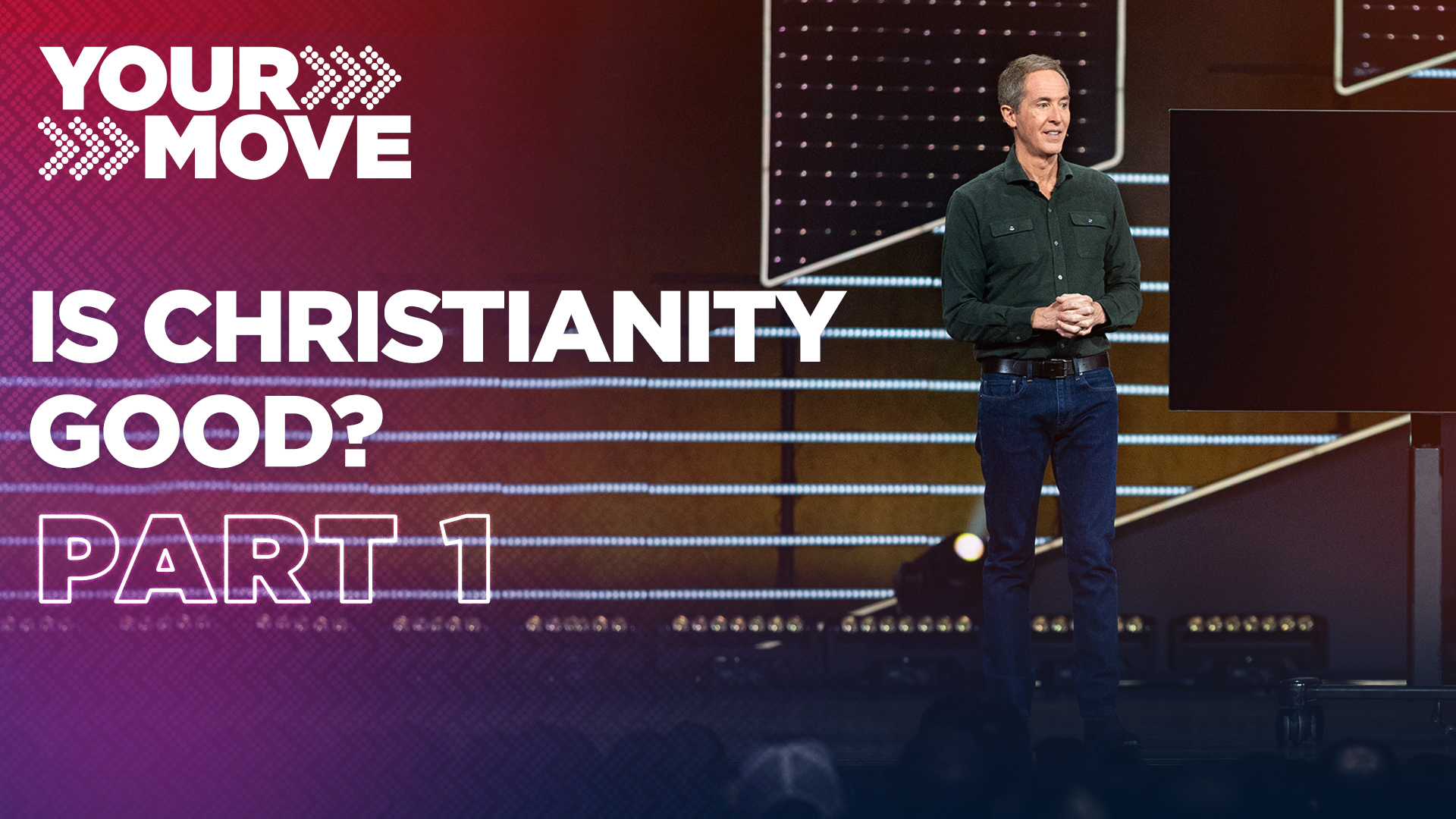The Old Testament is the gritty, epic history of the people of Israel. But even broader than that, it’s the story of God preparing the world for a Savior.
- Has something in the Old Testament ever caused you to question or doubt the existence and/or nature of God? If so, explain.
- If you grew up learning stories from the Bible, did you ever encounter people who tried to “tidy up” parts of the Old Testament? How did they do so?
- Andy mentioned that the texts in the Old Testament tell the story of God’s fulfilled contract with the people of Israel. In contrast, his new covenant, instituted by Jesus, involves not just one nation but all nations. Does this change, challenge, or reinforce your view of the Bible and/or God? Explain.
- How is reading the Old Testament as a historical record of the Hebrew people different than reading it as a spiritual guidebook?
NOTE: The following content is a raw transcript and has not been edited for grammar, punctuation, or word usage.
So, we’re in part three of the series, The Bible for Grown-Ups. And the reason I wanted to do this is that most of us know some Bible stories. And if you grew up in church, you probably know a lot of Bible stories. And if you didn’t grow up in church, you know just enough Bible stories to know that you don’t believe the Bible stories, possibly. Or maybe you grew up in church with the Bible stories, and then as you became an adult, you thought, “Wait a minute. That stuff couldn’t have happened.” And part of the problem is, while many of us know some Bible stories, very few of us know the story of the Bible. I’m convinced that knowing the story of the Bible or knowing how we got the Bible is almost as important as knowing what is in the Bible. Because if you don’t know the story of the Bible, it’s easy to discount or dismiss the stories that are actually in the Bible.
And one of the things that makes this so challenging for us is the way that we got our Bibles; it’s not the way the world got the Bible. By the time you got a Bible––if you got a Bible as a child or as an adult––it was all chaptered and versed and mapped and wrapped. But that’s not how the world got the Bible. Jesus didn’t write the Bible, but if it weren’t for Jesus, there would not be a “B-I-B-L-E.” The story of the Bible does not begin with Genesis, the story of the Bible actually begins with Jesus. And here’s why I say that.
The story of the Bible actually begins in the first century when Jesus’ tomb was found empty. And then Jesus was seen, and his cowardly followers who ran when he was arrested showed up in the streets of Jerusalem and said, “He’s back. He’s alive from the dead.” And thousands of Jewish people in the very area where Jesus was arrested and crucified––an area of Judea, specifically the city of Jerusalem––embraced Jesus as their savior. And the church launched; the church began. And suddenly, something was true that wasn’t true before. Suddenly, there was interest in documenting the life, the words, and the works of Jesus. Because if Jesus had stayed dead, we probably would have never heard of Jesus. There would have been no church and no Christianity, and, consequently, there would have been no Bible. And that’s why I say the story of the Bible actually begins with the resurrection of Jesus.
In fact, Luke, a doctor in the first century, tells us that many, many people got together. And he said that many people tried to document or sat down or attempted to document the life of Jesus. And so––we said in the first week––this is where we get Matthew, Mark, Luke, and John, four accounts of the life of Jesus. Two Greeks and two Jews who sat down to document the life of Jesus. Then, eventually––as I said before––the apostle Paul left that region of Judea and Galilee and began to spread the word about Jesus and his teaching to Gentiles around the Mediterranean Rim.
Now, this is where the story picks up from last time. When Gentiles, non-Jewish people, became enamored with a particular Jew, Jesus, they immediately became enamored with the sacred text of the Jews: what we’ll call the Hebrew Bible. This is the Hebrew Bible that I used in graduate school. When I say “used,” I mean “barely used.” My only C in graduate school was in one of my four semesters or my two years of Hebrew, it’s an extraordinarily difficult language. But this is the Hebrew Bible, or the Jewish Scripture, or what Jesus and first-century people referred to as “the Law and the Prophets.”
Now, early on, Gentile Christians in the late first century––especially in the second century––embraced these texts as Scripture. But here’s where the story line gets complicated. They did not embrace the Hebrew Bible or the Jewish Bible as Jewish Scripture. They embraced the Scripture as Christian Scripture, because while Gentiles were certainly interested in the Jewish Scripture, they were not in the least bit interested in the Jewish religion.
So, consequently, the church––Christians––they took the book; they didn’t take the religion. They took the book; they didn’t take the culture. Their interest was not historical or cultural. Gentiles’ interest in this book was Christological, a brand-new word for some of you. They went into the Hebrew Bible not looking for the Hebrews. They went into the Hebrew Bible looking for Christ, looking for Jesus, and then they found him everywhere. They found him in places he was not. They found all kinds of texts that they decided were about Jesus. And of course, the Jewish scholars and leaders were just appalled that these non-Jewish people who couldn’t even read Hebrew would do such damage to their text in the way that they interpret the text. But the Gentiles actually rejected Jewish interpretation of the Jewish text.
So, what happened is, essentially, the early Christian church took the Hebrew text and they essentially baptized it, Christianized it, and allegorized it. And unfortunately, for the most part, they downplayed or completely ignored––but certainly didn’t teach sequentially––the fabulous, gritty, epic history of the Hebrew people. Because the Old Testament––they call it “the Law and the Prophets” but we call it the Old Testament––the Old Testament chronicles God’s redemptive sequential activity in history, in the world.
In Genesis––as we saw last week––God shows up at the beginning as Creator, but very quickly, in the book of Genesis, he takes off his creator hat and puts on his founder hat. And God begins founding a nation in order to bring redemption to the world. And he begins with a man named Abraham who has no family and no children. And through Abraham, he births a nation with an international, multi-generational purpose. He births a nation that would eventually be enslaved in Egypt and by a super power, by a pharaoh who considered himself related to the gods, close to the gods. And then at the right time, God sent his servant Moses––the savior Moses, so to speak––into that environment. And he goes to Pharaoh, and he says, “You are to let my people go. You’re to let God’s people go.” And he spoke on behalf of God. And Yahweh, the Jewish God, spoke to Pharaoh in the only terms a Pharaoh could understand: violence and power. And at the end of this epic story, he frees his people. They leave Egypt, and they leave Egypt wealthy. The text says that they plundered the nation. The people were so happy for the Hebrews to leave.
Moses leads them to Mount Sinai, and there, God establishes a covenant with his people. And he says to the Hebrews––the ancient Hebrews––he says, “I’m gonna be your God, and you’re gonna be my people. And you’re gonna be separate from all the surrounding nations, because I have a very, very, very specific plan for you. Because through you, my people, we/you are going to bless the entire world.” And he said to them, “Here are the rules. Here are the stipulations. Here are the laws. Here’s a covenant.” It’s basically a contract. And he said to them, “I’m gonna give you your own land. And when you get to this land, if you obey me, I’m gonna prosper you. But if you disobey me, for the sake of the world who’s watching, I’m going to have to punish you. And if you take on the customs and the religious traditions of the surrounding nations… If you embrace the morality of the surrounding nations… If you embrace the polytheism of the surrounding nations, I’m going to give you to the surrounding nations so that you get a real good dose of that so that when you repent, I can bring you back to the land.” It was conditional in the sense that God would bless them if they obeyed; it was unconditional in the sense that they would always be his chosen people with a specific agenda in mind. And all this was outlined at Mount Sinai when Moses came down––not with ten commandments––with 613 commandments.
Now, I wanna talk about those commandments for just a minute, because critics and skeptics for generations, in fact, from the very beginning, had an unrelenting criticism of the terms and conditions, the laws and the restrictions that are connected with the Sinai covenant. In fact, in Richard Dawkins’ book The God Delusion––which I read the whole book a couple of years ago––he says this. And this is just a snapshot of what perhaps you heard in college or in university, or maybe the reason that you lost faith is because you had a version of Christianity that said, “The B-I-B-L-E. That’s the book for me, and all sixty-six books I gotta believe and do everything in all sixty-six books.” And somebody came along, and they showed you some of the verses in the Old Testament, specifically as it related to the Jewish law. And you said, “Wait a minute. What kind of God would say those kinds of things or ask those kinds of things?” And the reason, perhaps, you lost faith is because you embraced Richard Dawkins’ view or other people’s view of this extraordinary, extraordinary covenant that God created with his people. But here’s what Richard writes.
He says, “Judaism: originally a tribal cult of a single, fiercely unpleasant God, morbidly obsessed with sexual restrictions and with the smell of charred flesh.” And he goes on and on and on criticizing God. And if this is all you read, and then somebody pointed out a verse here and a verse there, of course you would walk away thinking, “Wow. Why would anyone take this seriously? And why would anyone take anything that came from this seriously?” And that’s why I wanted to stop and talk about this for just a minute, because Richard Dawkins and those like him are absolutely wrong when it comes to understanding the Hebrew Bible, the Jewish Scripture, what we would call the Old Testament. I wanna give you two examples.
Leviticus chapter 18. So, there’s Genesis, Exodus, and Leviticus. This is where the majority of the detailed law is found. And then you get to Numbers. It’s like, “What? What?” And Deuteronomy, “I think we just read this in Leviticus.” It’s like, “Where does the storyline pick up?” But this is a detailed covenant that God established with ancient Israel. So, anyway, when you get to Leviticus 18, you find nineteen plus––or minus, depending on how you count ’em––nineteen sexual prohibitions, nineteen laws dealing with sexuality. And if that’s all you heard, you would say, “See, that’s why I’m not a religious person. It’s certainly why I’m not a Christian, because there goes God messing with our personal life and getting in the bedroom. And it’s none of his business. And it’s none of your business. And I don’t wanna have anything to do with…”
All nineteen of these prohibitions that we find in Leviticus, all nineteen were practiced in Egypt and all nineteen were practiced in Canaan. So, God has said to the nation, “Look. I’m asking you to be different. I want every area of your life to be different ’cause you’re my people.” But here’s the fascinating thing that people overlook, and it’s why I wanted to spend just a minute focusing on this. Today––and right now––in every single developed nation in the world––and in most of what we would consider undeveloped or developing nations in the world––today in every single developed nation in the world, seventeen of the nineteen behaviors prohibited in Leviticus are either illegal or frowned upon today. Seventeen out of nineteen.
Point being this. The Hebrew people, the law that God gave the nation, the law that God gave Moses to give to the nation, the Hebrew people were way, way, way ahead of their time. And the reason that’s the case is because the theme of these sexual prohibitions, it has to do with… Well, let me just show you kind of the theme for this whole section. It says this, “No one is to approach any close relative to have sexual relations.” Which seems very reasonable to me.
And it seems very reasonable to you. It did not seem reasonable to ancient Egyptians, Canaanites, or the surrounding nations. In fact, let me just tell you how way ahead of their time the Hebrew people were and the law of Moses was. The law of Moses, meaning the Sinai covenant that they believe came from God. There are about fifteen hundred years separating the giving of the law and Jesus showing up on planet Earth. So fifteen hundred years later, Roman civilization has slowly begun to embrace much of these sexual ethics that God gave the Hebrews fifteen hundred years before. But over in Egypt, fifteen hundred years later, the monarchs are still marrying their siblings. It would take another several generations for that to finally––that behavior––to be weeded out of or walked away from even Egyptian civilization.
The point being this. You can’t just fly over the Sinai covenant and go, “Oh, it’s so antiquated. Oh, those people. How in the world could God be so old-fashioned and narrow-minded?” It’s not that way. I don’t wanna say the devil is in the details because that sounds kinda weird. But the devil’s kind of in the details. When you get down into the details, it’s like, “Oh, it’s not as simple. It’s just casting Yahweh, the God of the Jews, aside.” And in fact, the Mount Sinai covenant that God established with the ancient Israel is a moral and civil code that when understood in its ancient context––I’m telling you––it was brilliant. And every scholar knows, and every historian knows that you never ever, ever pull something out of its ancient context and compare it to things going on in a modern world. Nobody does that.
God is like a good Father. God always accommodates to our capacity. As a parent, you did this, or your parents did this. If a five-year-old says, “Where do babies come from?” They get a different answer than when a 15-year-old says, “Where do babies come from?” It’s a different answer when a medical student says, “Where do babies come from?” And nobody lies, but everybody accommodates to the capacity of their audience. They accommodate to the capacity of their children. And in the Sinai covenant, we see God, who has developed a nation, created a nation for a very specific purpose while accommodating to the maturity and the ancient times: what they knew and what they don’t know. And even with his accommodating ability and his willingness to accommodate, the Sinai covenant is absolutely brilliant. It strikes us as unsophisticated and barbaric, but, in fact, it was superior. It was superior in every way to the civil and religious codes and moral codes of the surrounding nations.
In fact, specifically, the protections afforded to the most vulnerable were nothing short of revolutionary. Women were better protected and had more rights. Servants, foreigners, and children, they all fared better under the Sinai covenant than their counterparts did in the surrounding nations. And why? Because of what we said last week. Because the Hebrews, from the very beginning, believed that there was a single God, not a multitude of gods, a single God who created mankind and womankind in his image. They believed that everyone was born with dignity. The Hebrew people did not worship creation; they were the pinnacle of creation. And this set them apart from the very beginning, and it would take centuries for the rest of the world to finally catch up.
Okay, so back to the storyline. Then, after the Sinai covenant, against God’s better wishes, Israel––now that they were a sort of a nation state––they decided they wanted to have a king. And so, eventually, Israel got herself a whole bunch of kings. God didn’t want Israel to have a king, but they got themselves a king. And most of Israel’s kings were disasters, because such is the nature of a king; such is the nature of someone who holds all the cards and has all the power. They raised taxes; people don’t like taxes. They raised armies; armies are expensive. And they had multiple wives. At any time, when someone has multiple wives, things are complicated.
And then, as time went by, with their third king, they got what every other nation had. They got themselves a temple, but their temple was different than all the surrounding nations’ temples. It wasn’t different in the way it looked necessarily. In fact, it was kind of organized and built like a traditional pagan ancient temple. But the Jewish temple did not have one thing that all great temples had: there was no image of the God for whom the temple was built. You built a temple for a specific god and as part of the temple, you would have a god vault. And in the god vault, would be the statue or the image of the god for whom the temple was built.
Well, the Jewish temple had everything any temple would have. And they had a God vault that we call “the Holy of Holies.” And in the Holy of Holies, there was no image, because one of the big Ten Commandments was, “You don’t create any image of me because I’m Yahweh. I’m the one and only God. And I cannot be contained in, or described by, or narrowed down to, or reduced to an image. And by the way, I don’t live in this house. I’m the mobile God. If you don’t think I am, just ask Pharaoh. Because I visited him a few hundred years ago, and they still haven’t gotten over it.”
So, back to our storyline. And then because the kings were constantly misbehaving, every once in a while, God would send prophets to warn and correct the kings. Now, when you read the Old Testament or the Hebrew Bible, a great deal of the text are the rants and the ravings and the writings and the warnings and the illustrations of these prophets. And as you may know––or you should know––every single one of the prophets is addressing a specific historical context. Every single one of the prophets is addressing something going on, primarily with one of the kings, the kings of Israel, the northern kingdom, or the southern kingdom. But every once in a while, the prophets would look beyond their immediate historical context to a future day when God would do something through the nation of Israel for the nations of the world.
One of the most fascinating illustrations of this is found in the book of Isaiah. Isaiah was a prophet who wrote the book of Isaiah about six hundred years before the time of Christ. And much of his prophecy makes sense within its original context, the issues that he was addressing during that period of time. But there is one portion of what he wrote that was mysterious to the original audience. They read what he wrote, and he talked about this mysterious suffering servant whose suffering would somehow benefit the nation, which kinda made sense. But somehow, his suffering was gonna benefit the entire world. And the details about this suffering servant kind of conflicted with temple worship and with the whole temple structure.
So, I’m gonna read you just a few verses from Isaiah 53. As Isaiah looks beyond this immediate context to this ultimate fulfillment of what God had in mind for the nation of Israel. He writes, “He was despised and rejected by mankind.” And the original audience would go, “Who’s he? ‘A man of suffering and familiar with pain, but he was pierced for our transgressions.’ Wait a minute. A person was pierced? ‘Yes, he was crushed for our iniquities.’ A person paid the price or the penalty for someone else’s sin or iniquities? I mean, that’s what we did with lambs and sheep and goats. That’s what the whole sacrificial system was all about.”
Isaiah continues, “The punishment that brought us peace was on him, and by his wounds, we are healed and are made right with God. The Lord has laid on him…” The original audience would ask, “Who is this him? ‘The Lord has laid on him the iniquity…’ No, the Lord doesn’t lay on people the inequity of all of us. The Lord lays it on animals as a temporary covering the inequity.” Isaiah continues, “The Lord has laid on him––a person, a man––the iniquity, the sin of all of us… For he was cut off from the land of the living. He died for the transgression of my people. He died for the transgressions of other people. He was punished. He was assigned a grave. And not only was he killed, he was buried with the wicked and with the rich in his death.” And then Isaiah says this, “And after he suffered, he will see the light of life…” The original audience may think, “Wait, this sounds like he comes back to life.” Isaiah continues, “And be satisfied. By his knowledge, my righteous servant will justify many, and he will bear their iniquities.”
When I was in graduate school––the same time I was trying to make my way through Hebrew––I had a professor who was Jewish. Both of his parents were Jewish and brought up in a Jewish home. And when he went to college, he had a Christian friend who kept inviting him to church. And he said, “I’m not going to your church.” And then one day, this Christian friend walks up with a piece of notebook paper all folded up small and said, “Just read this.” My professor said, “I went to my dorm, and I opened it up. It was written front and back, and he had written out Isaiah 53, the entire chapter.” And then it said at the bottom, Isaiah 53. He said, “I read it, and I had never read this before. And I thought to myself, ‘Wait a minute, this isn’t in the Hebrew Bible.'” He said, “I wasn’t really attending synagogue at the time. So, I went and found my Hebrew Bible, and I looked it up. And sure enough, there it was. I was so confused.”
He said, “So, I actually called a rabbi in my community that I had never met, made an appointment, and went to see him. I unfolded this piece of paper and said, ‘Look. Is this really in the Hebrew Bible?’ And the rabbi said, ‘Well actually, it is.'” And my professor said to him––he told us, in front of a whole class––that he asked the rabbi, “Who is this talking about? Who is him?” And the rabbi said, “Well, it sounds a lot like Jesus. Doesn’t it?” And he said, “Yeah, that’s what my Christian friend keeps telling me.” And the rabbi said, “Well, as you know, we’re Jewish, so we don’t accept that.” So, he went back to his dorm, and he just could not get over this. He eventually became a Jesus follower and became a seminary professor to teach Christian theology.
Now, the reason I pause and spend so much time on that is because I know we have Jewish people who attend or who watch, or you have family members. And I just want you to hear from me, the story of your people––and you know this better than I do––it’s fabulous. It’s epic. And your prophet predicted in extraordinary detail what would eventually be fulfilled about six hundred years later with extraordinary, precise detail. It’s just something to consider, because over and over in the Hebrew Bible, over and over in the sacred text, the Jewish people were reminded that they were a divine means to a divine end. And being a means to an end is what makes something meaningful. If you wanna live a meaningful life, you have to become a means to an end that is not yourself.
To summarize it this way, it’s like God wades into the fray and plays by the rules of the kingdoms of this world in order to usher in a kingdom not of this world. And to sand off the rough edges of God’s Old Testament behavior is to miss the mess that he waded into in order to see the story of redemption played out to its bloody “crucify him, crucify him” end. Our Old Testament––the Jewish or the Hebrew Bible––is a saga of an ancient people struggling to survive in a world where food was scarce, enemies were real, and death was just a minor infection away. But in spite of that, they clung to Yahweh; they clung to their God. And he, in turn, clung to his nation, careful not to override their freedom with his presence. I mean, the entire story is gritty. It’s powerful. It’s history with a divine purpose. It’s history with you in mind. It’s history with us in mind. It’s history with the world in mind. It was purposeful. A purpose announced by God to Abraham and fulfilled twenty-two thousand years later when a Jewish carpenter discovers that his fiancé was pregnant. And suddenly, the next part of the story, the fulfillment of Isaiah and other prophets would begin.
The apostle Paul who was a Pharisee––a Pharisee, the Apostle Paul, who knew this book inside and out––summarized it best when he wrote this, writing a letter to some Christians living in the Roman province of Galatia. Here’s what he said. He said, “But when the set time had fully come…” I love that. “When the set time had fully come… When God finally got everything and everybody in place… When the set time had fully come… When that man Abraham had become a family that became a nation that became a kingdom… When the set time had fully come… Then and only then, God sent his Son, born of a woman, born under the law. The law. The law that God gave to the nation of Israel. The law that played the role of tutor until the new lawmaker stepped into the pages of history to redeem those under the law so that we–– so that you––so that we might receive adoption to sonship.”
The story of the Old Testament, the story of the Jewish people, honestly, it should cause all of us to drop to our knees in gratitude. There is no need to tidy it up. It is not a spiritual guidebook. It is the story of God preparing the world for his Messiah, for your Savior.
So, by the second century, the Gentile church, who still did not have a Bible of their own––the Gospels probably had been written and were in circulation, but they had no Bible of their own––the Gentile church quickly adopted the Jewish Scripture as Christian Scripture and began using it in Christian worship. And eventually, they gave it a new name. They begin calling it the Old Covenant––the entire volume, everything involved––they would call it the Old Covenant. And then later, the Latin term would be used: testament. It became the Old Testament. And why “old”? Because Gentile Christians recognized that God, through Christ, had done something new. They recognized that God had fulfilled his Old Covenant promises to his nation and to his people and had established a brand-new covenant with the nation and with all the nations of the world. A covenant that Jesus would say, “would be instituted and inaugurated in his blood.” But still at this point in history, there’s still no Bible. There is just Hebrew text, some stories of the accounts of the life of Jesus and some correspondence by a very famous church planter to his Gentile congregations around the Mediterranean rim.
And we will pick the story up there next week in the concluding episode of The Bible for Grown-Ups.











